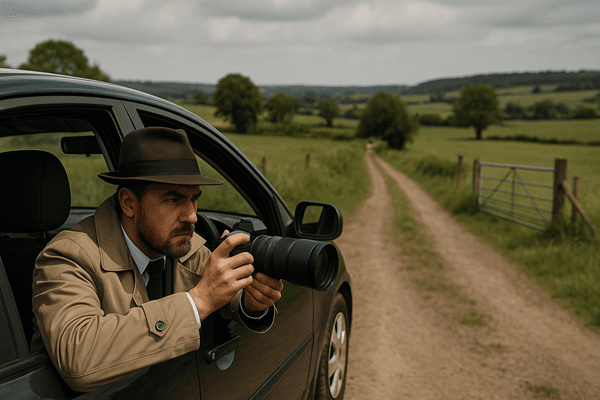Surveillance in the countryside brings a new set of hurdles when compared with more urban locations.
Wide-open spaces, sparse populations and unpredictable conditions all make tailing a subject outside urban areas very different from keeping tabs on someone in a city.
Different, but not impossible.
Here are the main challenges investigators face when working in rural environments, and some hints on what to look for from your chosen private investigator to make sure you’re working with someone reliable.
Difficulties Blending In
In a town you can drift through a crowd or linger in a coffee shop without drawing attention. In the country it’s not so easy. A vehicle that never appears on a quiet lane stands out to locals who know every car by sight. This could be especially tricky for private detectives in west yorkshire, where there are many quite roads.
On foot it’s even harder to disappear, there’s no stream of commuters or shoppers to hide among. Standing by a hedgerow with a camera or parked beside a farm gate with the engine off is likely to spark questions from anyone passing by.
You have to choose your vehicle, timing and cover stories very carefully to avoid being spotted.
Mobile Signal Issues
Surveillance plans often change at a moment’s notice, maybe your subject takes an unplanned detour, or your client has new information on the target’s location.
In a town you’d simply send a text or make a quick call, but rural areas are notorious for patchy reception or no signal at all. That can leave you cut off when you most need to coordinate with colleagues or confirm a move.
Pre-arranged check-in points, two-way radios or even satellite messengers can help bridge the gaps, but each option brings its own cost and learning curve.
Natural Light Restrictions
Cities and towns give you plenty of artificial light, street lamps, shop windows and passing headlights can all help you capture usable footage after dark.
Out in the sticks, light pollution is minimal and most roads are unlit once the sun goes down. If you need clear images or video your surveillance window usually ends with dusk.
That can be a problem if your subject tends to meet contacts in the early evening. You’ll either have to schedule your tailing around sunrise and sunset or invest in night-vision kit and portable lighting, both of which increase your risk of being noticed.
These challenges might sound daunting, but they’re all part of professional rural surveillance.
A skilled investigator will explain each one during your initial consultation, outline how it affects timing and budget, and put together a plan that keeps your operation as discreet and effective as possible.
An unreliable investigator or someone inexperienced in working in rural locations might not discuss them with you at all, and then come back to you with excuses and requests for more money once they realise things aren’t going to plan.
If you need countryside surveillance, you need to work with someone experienced in the field, no pun intended. Call EJM Investigations on 01772 334700. We’ll work out the best approach to gather the evidence you need, wherever your subject may travel.

